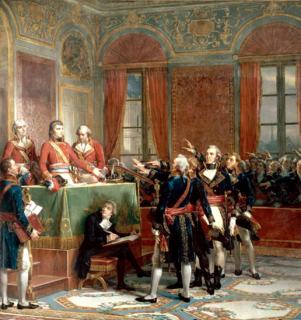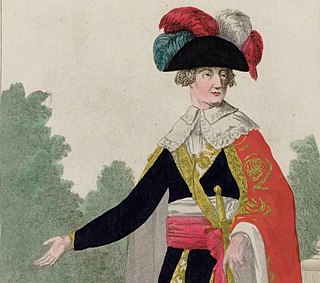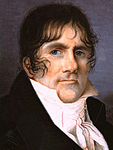
In the history of France, the First Republic, officially the French Republic, was founded on 21 September 1792 during the French Revolution. The First Republic lasted until the declaration of the First Empire on 18 May 1804 under Napoléon Bonaparte, although the form of the government changed several times.

The Bourbon Restoration was the period of French history following the first fall of Napoleon in 3 May 1814 to the July Revolution of 26 July 1830, but interrupted by the Hundred Days War from 20 March 1815 to 8 July 1815. The brothers of the executed Louis XVI, namely Louis XVIII and Charles X, successively mounted the throne and instituted a conservative government aiming to restore the proprieties, if not all the institutions, of the Ancien Régime. Exiled supporters of the monarchy returned to France. They were nonetheless unable to reverse most of the changes made by the French Revolution. Exhausted by decades of war, the nation experienced a period of internal and external peace, stable economic prosperity and the preliminaries of industrialization.

The Directory was the governing five-member committee in the French First Republic from 2 November 1795 until 9 November 1799, when it was overthrown by Napoleon Bonaparte in the Coup of 18 Brumaire and replaced by the Consulate. Directoire is the name of the final four years of the French Revolution. Mainstream historiography also uses the term in reference to the period from the dissolution of the National Convention on 26 October 1795 to Napoleon's coup d’état.

The following is a timeline of the French Revolution.

Orléanist was a 19th-century French political label originally used by those who supported a constitutional monarchy expressed by the House of Orléans. Due to the radical political changes that occurred during that century in France, three different phases of Orléanism can be identified:

The Consulate was the top-level Government of France from the fall of the Directory in the coup of 18 Brumaire on 10 November 1799 until the start of the Napoleonic Empire on 18 May 1804. By extension, the term The Consulate also refers to this period of French history.

Joseph Fouché, 1st Duc d'Otrante, 1st Comte Fouché was a French statesman, revolutionary, and Minister of Police under First Consul Napoleon Bonaparte, who later became Emperor Napoleon. He was particularly known for the ferocity with which he suppressed the Lyon insurrection during the Revolution in 1793 and for being minister of police under the Directory, the Consulate, and the Empire. In English texts, his title is often translated as Duke of Otranto.
This is a glossary of the French Revolution. It generally does not explicate names of individual people or their political associations; those can be found in List of people associated with the French Revolution.

The Coup of 18 Brumaire brought General Napoleon Bonaparte to power as First Consul of France and in the view of most historians ended the French Revolution. This bloodless coup d'état overthrew the Directory, replacing it with the French Consulate. This occurred on 9 November 1799, which was 18 Brumaire, Year VIII under the short-lived French Republican calendar system.

The Council of Five Hundred, or simply the Five Hundred, was the lower house of the legislature of France under the Constitution of the Year III. It existed during the period commonly known as the Directory (Directoire), from 26 October 1795 until 9 November 1799: roughly the second half of the period generally referred to as the French Revolution.

Claude-Emmanuel Joseph Pierre, Marquess of Pastoret was a French lawyer, author and politician.

Jean-François-Auguste Moulin was a general of the French Revolution and member of the French Directory. He had a long career as a military officer serving France in the Royal Army of King Louis XVI, the Garde Nationale of the French Revolution, and the Grande Armée of Napoleon Bonaparte.

The French Directory election of 1798 was held between 9 and 18 April 1798 and marked the beginning of the end of the French far-left and rise of the anti-mountain and anti-jacobin parties in France. The 1798 elections were partially invalidated by the passage of the Law of 22 Floréal Year VI which saw 106 members of the mountain lose their seats by decree of the Council of Five Hundred.

The French Director election of 1795 was held between 12 and 21 October 1795, which saw 1/3 of the directory elected according to the Constitution of the Year III. The election was the first election under the new Directory regime, and first election where the Thermidorians would win.

The White Terror was a period during the French Revolution in 1795 when a wave of violent attacks swept across much of France. The victims of this violence were people identified as being associated with the Reign of Terror – followers of Robespierre and Marat, and members of local Jacobin clubs. The violence was perpetrated primarily by those whose relatives or associates had been victims of the Great Terror, or whose lives and livelihoods had been threatened by the government and its supporters before the Thermidorean Reaction. Principally, these were, in Paris, the Muscadins, and in the countryside, monarchists, supporters of the Girondins, those who opposed the Civil Constitution of the Clergy and those otherwise hostile to the Jacobin political agenda.
The Clichy Club was a political group active during the French Revolution from 1794 to 1797.

The Coup of 18 Fructidor, Year V, was a seizure of power in France by members of the Directory, the government of the French First Republic, with support from the French military. The coup was provoked by the results of elections held months earlier, which had given the majority of seats in the country's Corps législatif to royalist candidates, threatening a restoration of the monarchy and a return to the ancien régime. Three of the five member of the Directory, Paul Barras, Jean-François Rewbell and Louis Marie de La Révellière-Lépeaux, with support of foreign minister Charles Maurice de Talleyrand-Périgord, staged the coup d'état that annulled many of the previous election's results and ousted the monarchists from the legislature.
The Panthéon club was a French revolutionary political club founded in Paris the 6 November 1795. Its official name was Reunion of Friends of the Republic. It was composed of former terrorists and unconditional Jacobins coming from the petite bourgeoisie.

The French Directory election of 1799 was held between 9 and 16 April 1799 to elect one-third of the Council of Five Hundred in addition to the Council of Elders and any vacant seats.
The Liberals was a short lived French liberal political party which was active in several elections before being absorbed into the Doctrinaires, a fellow constitutional monarchy party. Several members of the Liberals eventually went on to serve in the Movement Party and even later in the Orléanist parties. The precedent set by the party would help form modern French classical liberalism, something used in the modern centre-right Republican party.

















